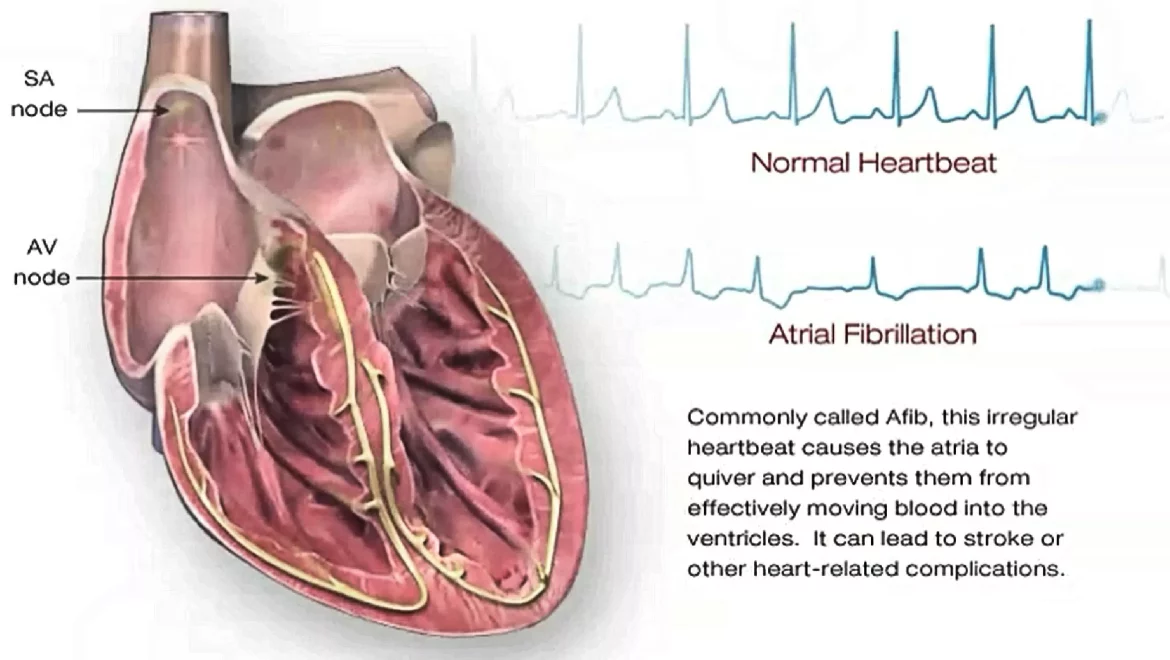Heart arrhythmia, a condition characterized by irregular heartbeats, affects millions of people worldwide. These irregularities can range from harmless to life-threatening, causing symptoms such as palpitations, dizziness, and shortness of breath. Understanding heart arrhythmia is the first step toward managing it naturally.
Causes And Types of Heart Arrhythmia
Heart arrhythmia can be caused by various factors, including coronary artery disease, high blood pressure, diabetes, excessive alcohol consumption, smoking, and stress. There are several types of arrhythmias, each with unique characteristics:
Atrial Fibrillation (AFib): Rapid and irregular beating of the atria.
Bradycardia: Slow heart rate.
Tachycardia: Fast heart rate.
Ventricular Fibrillation: Rapid and chaotic heartbeats originating in the ventricles.
Understanding the specific type of arrhythmia is crucial for effective natural management.
SEE ALSO: What Is Sudden Cardiac Arrhythmia?
How to Stop Heart Arrhythmia Naturally
Lifestyle modifications are fundamental in managing heart arrhythmia. These changes can significantly reduce the frequency and severity of arrhythmias.
1. Diet and Nutrition
Adopt a Heart-Healthy Diet
A balanced diet rich in fruits, vegetables, whole grains, lean proteins, and healthy fats is essential. Specific dietary considerations include:
Omega-3 Fatty Acids: Found in fatty fish like salmon and flaxseeds, omega-3s can help stabilize heart rhythms.
Magnesium-Rich Foods: Leafy greens, nuts, seeds, and whole grains can help maintain a regular heartbeat.
Potassium-Rich Foods: Bananas, oranges, and potatoes can help regulate heart function.
Limit Caffeine and Alcohol
Excessive caffeine and alcohol can trigger arrhythmias. Reducing or eliminating these from your diet can help manage symptoms.
2. Regular Physical Activity
Engage in Aerobic Exercise
Regular aerobic exercise, such as walking, jogging, swimming, or cycling, can strengthen the heart and improve cardiovascular health. Aim for at least 150 minutes of moderate-intensity exercise per week.
Incorporate Yoga and Tai Chi
Yoga and Tai Chi are beneficial for reducing stress and improving heart health. These practices incorporate gentle movements, breathing exercises, and meditation, which can help regulate heart rhythms.
3. Stress Management
Practice Mindfulness and Meditation
Chronic stress is a known trigger for arrhythmias. Mindfulness and meditation practices can help reduce stress levels and promote relaxation. Techniques include:
Deep Breathing Exercises: Simple deep breathing can activate the parasympathetic nervous system, promoting calmness.
Progressive Muscle Relaxation: Tensing and then slowly relaxing each muscle group can reduce physical tension and stress.
Ensure Adequate Sleep
Quality sleep is essential for heart health. Aim for 7-9 hours of sleep per night and establish a regular sleep schedule.
4. Avoiding Triggers
Identify and Avoid Triggers
Keeping a symptom diary can help identify specific triggers for your arrhythmia. Common triggers include:
Dehydration: Ensure adequate water intake to maintain electrolyte balance.
High Sodium Intake: Excess salt can raise blood pressure and stress the heart.
Certain Medications and Supplements: Some medications and supplements can affect heart rhythm. Consult your healthcare provider before starting any new medication or supplement.
Herbal And Natural Supplements
Several natural supplements have shown promise in managing arrhythmia. However, it’s essential to consult with a healthcare provider before starting any new supplement regimen.
1. Hawthorn
Hawthorn has been used for centuries to treat heart conditions. It can help improve blood flow to the heart and strengthen heart muscle contractions.
2. Magnesium
Magnesium is vital for maintaining a regular heartbeat.
Supplementation can be beneficial, especially if you have a deficiency.
3. Coenzyme Q10 (CoQ10)
CoQ10 is an antioxidant that supports heart health and energy production. It can help improve heart function and reduce the frequency of arrhythmias.
4. Fish Oil
Fish oil supplements, rich in omega-3 fatty acids, can help reduce inflammation and stabilize heart rhythms.
5. Taurine
Taurine is an amino acid that supports cardiovascular function. It can help regulate electrolytes in the heart and prevent arrhythmias.
Acupuncture And Traditional Chinese Medicine
Acupuncture, a component of traditional Chinese medicine, involves inserting thin needles into specific points on the body to balance energy flow. Some studies suggest that acupuncture can help reduce arrhythmia symptoms and improve heart health.
Biofeedback Therapy
Biofeedback therapy involves monitoring physiological functions such as heart rate and learning to control them through relaxation techniques. This therapy can help reduce stress and manage arrhythmia.
Regular Health Check-Ups
Regular check-ups with your healthcare provider are crucial for monitoring heart health and managing arrhythmia. Your provider can help you track your progress and make necessary adjustments to your natural management plan.
When to Seek Medical Attention
While natural methods can help manage arrhythmia, it’s essential to know when to seek medical attention. Contact your healthcare provider if you experience:
Severe or worsening symptoms.
Persistent chest pain or pressure.
Fainting or severe dizziness.
Symptoms that interfere with daily activities.
Conclusion
Managing heart arrhythmia naturally involves a comprehensive approach that includes lifestyle changes, dietary adjustments, stress management, and possibly natural supplements. By understanding the condition and making informed choices, you can improve your heart health and reduce the impact of arrhythmia on your life.


